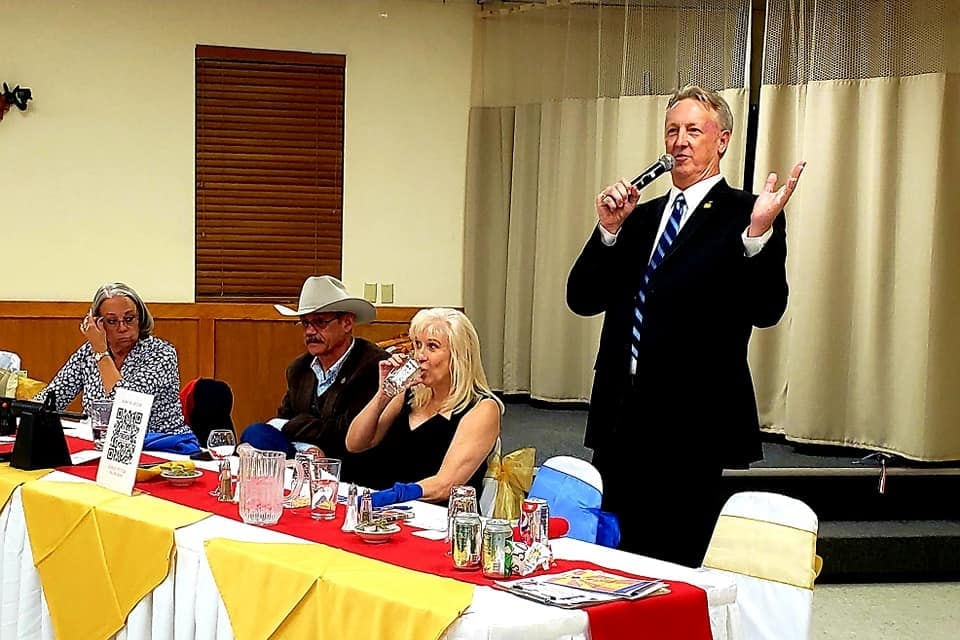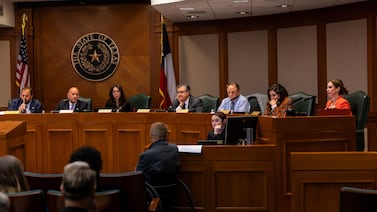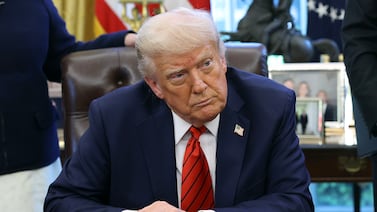Elections in Cochise County will now be run almost entirely by Recorder David Stevens, an election skeptic who has said he does not fully trust all of his county’s election procedures and believes the county can and should move to hand-counting ballots.
The Board of Supervisors for the southern Arizona county voted 2-1 on Tuesday afternoon to transfer the board’s election oversight to Stevens, giving up their statutorily-prescribed control over the appointment of the county’s elections director, Election Day procedures, ballot counting and presentation of election results. Republicans Tom Crosby and Peggy Judd voted yes, and Democrat Chairwoman Ann English voted no.
The supervisors moved forward despite a warning from the attorney general’s office they received on Monday night, in which the solicitor general wrote that he had serious concerns about the legality of the drafted agreement.
“If you are aware of legal authority for the draft Agreement, please promptly provide it to us,” Solicitor General Joshua Bendor wrote.
The move comes after Crosby and Judd for months challenged the county’s fall election procedures in ways that drew national attention, including attempting to illegally hand count all ballots and then refusing to certify the election results, against the advice of the county attorney and the secretary of state. The turmoil led to the recent resignation of the county’s well-respected elections director, Lisa Marra, who said she was disparaged and harassed as she refused to comply with the efforts.
Stevens helped propel the full hand count against the legal advisement. Even before Marra left, the board had already proposed giving him more control over elections.
The recorder is close with former GOP secretary of state candidate Mark Finchem, who built a campaign on false claims that the 2020 election was stolen.
While Arizona law splits election duties between the recorder and supervisors, many counties have given the recorder more authority over election procedures in the past, including Maricopa County for decades and, currently, Yuma County. Bendor appeared concerned about Cochise County’s proposal, though, because of the lack of clarity around just how much authority supervisors were giving Stevens – perhaps including establishing voting locations, appointing workers, approving ballot contests, and finalizing results. When Maricopa County agreed to grant more authority to the recorder, for example, the supervisors still approved voting locations, and the elections director still presented finalized results to the board.
Still, Secretary of State Adrian Fontes told Votebeat on Tuesday that historically, Arizona counties have made this type of decision on how to delegate election responsibilities and they should have the right to do so.
“Counties aren’t prevented from doing what they think is right,” Fontes said.
Supervisors move forward after hours of public debate
Crosby and Judd dismissed Bendor’s letter. After a closed session to discuss the letter, Judd said she didn’t see a problem going ahead.
“I realize we have been advised, we have this letter, oh my gosh, but it doesn’t sound like it has enough character or meat,” Judd said. “It’s not accusatory enough. It’s almost like (Attorney General Kris Mayes) didn’t know what to tell us, she just wanted to tell us something to try to stop us.”
Democrat Ann English said she felt the board was acting in an inappropriate and ill-advised manner, considering she doesn’t believe there are problems with the county’s elections or vote-counting machines.
“We built this house on sand,” English said, clearly referencing the false claims about election fraud the board has heard in recent work sessions leading up to the supervisors’ decision. “I think you have vilified the election process.”
The decision came after hours of impassioned public comment both for and against the plan. Some argued that giving Stevens more control over elections threatened to derail the integrity of the county’s system. Others, repeating the unfounded claim that the county’s vote-counting machines are insecure, said Stevens would bring more trust to the system and it would save the county money by not immediately appointing a new elections director.
Al Anderson said Crosby, Judd, and Stevens “have taken a wrecking ball to Cochise County’s election department.”
“Their big lie and conspiracy theorist followers must be very proud of them, whereas the rest of America looks down on us as being a bunch of whacko hicks,” Anderson said.
Another Cochise resident, Bob McCormick, said that Stevens is qualified for the job and combining the departments will be cost effective.
“Taking the interim job as elections director is the best way to solve the problem,” he said.
What role will Stevens have?
The agreement approved Tuesday is only temporary. It is set to end on Dec. 31, 2024, just after the November 2024 presidential election.
It names Stevens as interim elections director, an edit that Stevens made to the document just before it was passed. His edits were not posted publicly before the vote, but the board discussed some of them while voting.
It says that he will have the ability to appoint the permanent elections director. It also lists a few duties that Stevens will have, such as managing special taxing districts, but then says generally “the Recorder shall be responsible for all other election functions.”
From 1955 to 2019, Maricopa County gave its recorder more duties than prescribed in state law. But the county more specifically noted that the supervisors technically retained their responsibilities for elections under state law, even if the recorder was running them. Supervisors still approved some decisions made by the recorder, and the elections director still did the duties that state law gives to the “elections official,” such as presenting final election results to the board for approval.
The agreement Cochise County approved Tuesday is not that specific and it gives Stevens some of the elections director’s duties, such as presenting final election results to the board for approval.
Yuma County in 2019 shifted most election authorities under the recorder. But there is one major difference with the agreement, which Yuma County Recorder Richard Colwell provided to Votebeat on Tuesday. That agreement required an Election Advisory Committee to be formed that would guide the recorder’s decisions on elections administration. The committee is meant to be bipartisan and to provide expertise and transparency to the process, Colwell said.
Since taking office in July, he said, the committee has advised him on the appointment of an interim elections director and helped him make decisions about the location of drop boxes.
“So it’s not me singlehandedly making these decisions,” Colwell said.
Fontes said he has received numerous messages of concern and complaint from Cochise County residents worried about the recent challenges to the county’s election system.
He said he believes it’s important to point out the historical perspective that numerous counties have made the decision to transfer duties to the recorder in the past. But that doesn’t mean he agrees with the decision, he said.
“I’m of the mind, if it ain’t bad, don’t fix it,” he said.
Jen Fifield is a reporter for Votebeat based in Arizona. Contact Jen at jfifield@votebeat.org.






